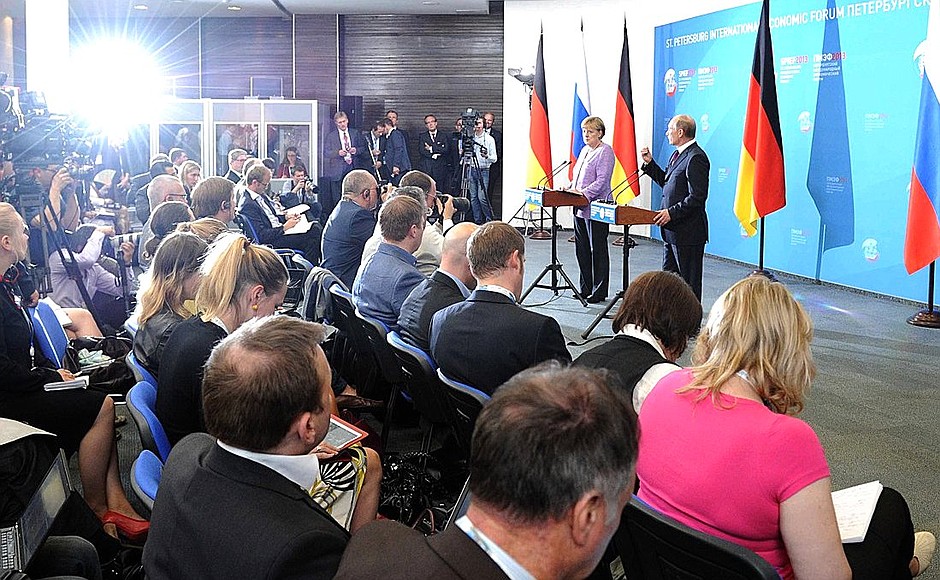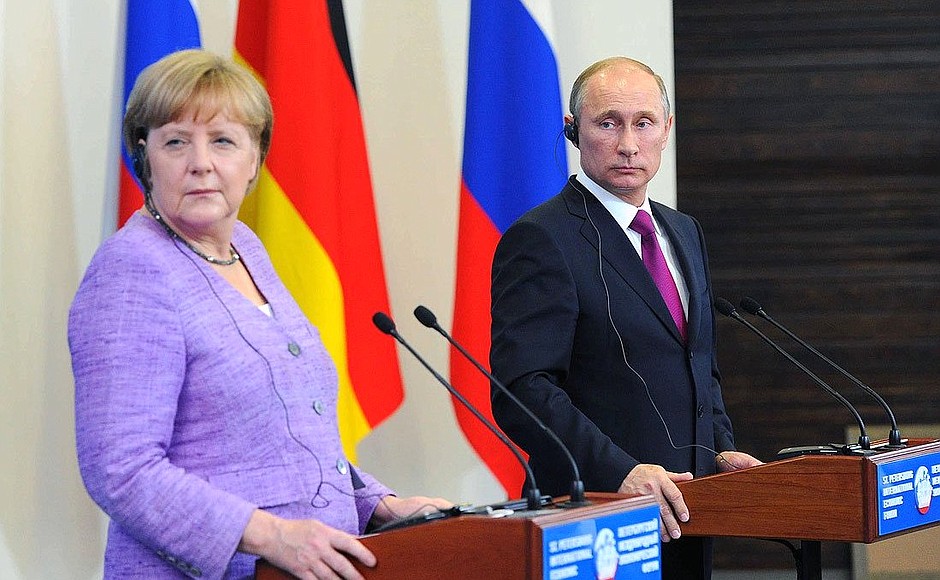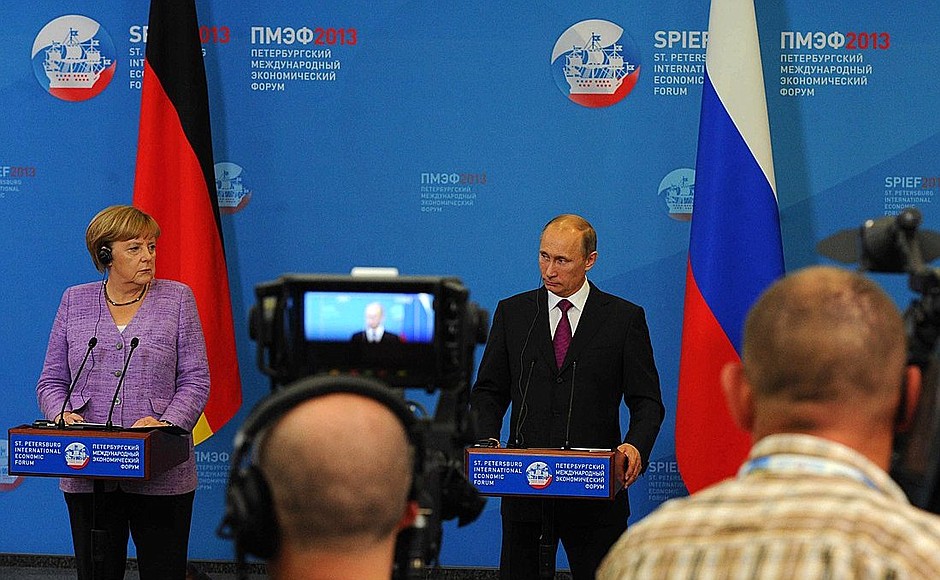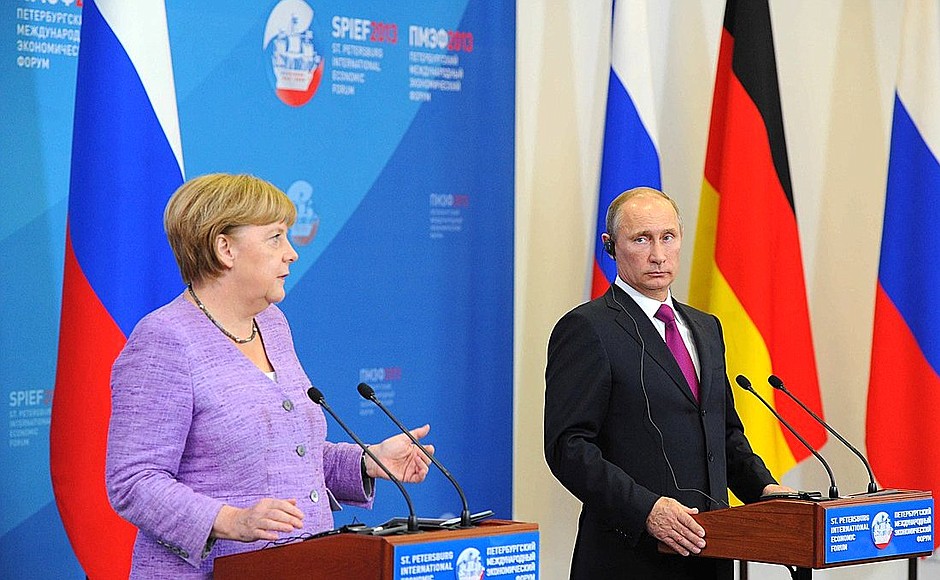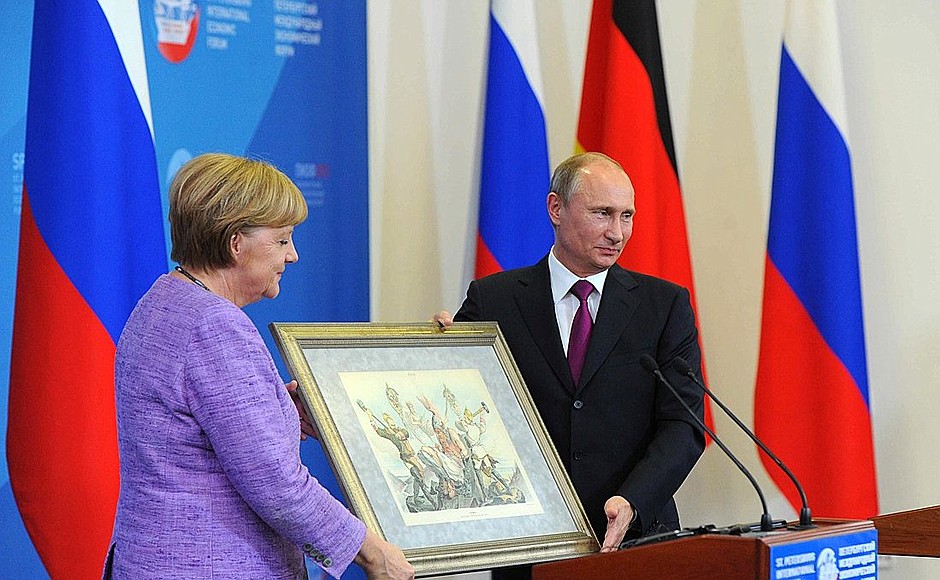President of Russia Vladimir Putin: Madam Federal Chancellor, colleagues,
We have just had substantial and constructive talks, discussed key aspects of our bilateral cooperation, and gone over our positions on current issues. This is our second full-format meeting this week. We worked together at the G8 summit in Lough Erne a few days ago. This intensive political dialogue is evidence of the strategic character of relations between Russia and Germany.
Russia was the main partner country at the Hannover Messe 2013 in April, and we in turn invited the German Federal Chancellor to be the guest of honour at the St Petersburg International Economic Forum.
Our relations in all different areas are developing rapidly. Our bilateral trade has reached a high level, with various estimates putting it at around $80 billion. The Federal Chancellor and I have set the goal of taking it even higher and aiming for, say, up to $100 billion. This will require initiative, good cooperation between our business circles, and new joint projects.
Following this news conference, the Federal Chancellor and I will meet with business leaders from both countries and discuss with them what we can do to further develop our cooperation, including in innovation fields.
Germany is already one of our biggest investors, with around $25 billion accumulated investment in the Russian economy. More than 6,000 companies with German participation are successfully doing business in Russia today.
The energy sector has long been an important area for our bilateral cooperation. We celebrated 40 years since the start of Russian natural gas deliveries to Germany this June. Russia now accounts for around 45 percent of gas supplies to the German market, and 23 percent of oil supplies. Our countries are working together on big projects such as Nord Stream and South Stream. German companies are taking part in developing the Yuzhno-Russkoye field together with Gazprom and are working on other projects too.
”Our relations in all different areas are developing rapidly. Our bilateral trade has reached a high level, with various estimates putting it at around $80 billion.“
Russia and Germany both seek to develop closer industrial cooperation in sectors such as aircraft manufacturing, transport, energy machine-building, and pharmaceuticals. High speed trains are being manufactured at Russian enterprises based on Siemens’ standards. Volkswagen is building a new car engine assembly plant in Kaluga Region. Of course, there should be even more joint projects of this kind.
We need German technology to help develop the Russian economy’s innovation sectors, modernise our transport and telecommunications infrastructures, and build social sector and sports facilities. This will offer potential contracts for German industry of course, and thus be a source of support and help to create jobs in Germany itself. Both countries understand that this kind of close cooperation will boost economic growth and help us to move faster.
We also discussed the opportunities for expanding our cultural and humanitarian relations. We have been holding reciprocal cultural years in our two countries in 2012–2013, and have organised more than 300 different events as part of this project.
The Federal Chancellor and I will visit an exhibition at the Hermitage this evening, as we agreed, to see what our colleagues are doing in the cultural sphere and how our joint work is progressing in this area.
We discussed today the possibility of organising another big joint event in 2014 – the Year of Russian Language and Literature in Germany, and the Year of German Language and Literature in Russia.
We also discussed today Russia’s relations with the European Union. I will not repeat now all of the issues that we are trying to resolve at the moment, but there is progress on this track too.
I am sure that today’s talks will give impetus to continued progress in our bilateral cooperation.
Thank you very much for your attention.
<…>
Question: Mr President, could you say again about why the joint participation in the opening ceremony was cancelled at first? My second question is about Syria. You said at the plenary session that the West is supplying weapons to the rebels in Syria, but no one knows where those weapons are going to end up. You are supplying weapons to Assad, and we know exactly where those weapons are ending up. He is the man who has aimed weapons at his own people. Do you have any influence on Assad to help end this war? And can you imagine a government in Syria without Assad?
Vladimir Putin: Let's start with Syria, because the first question doesn’t exist. We didn’t cancel anything but we weren’t sure we would have enough time to visit the exhibition. Now that the Federal Chancellor and I looked at the timing, we realised that we would have enough time for a news conference and a meeting with the business community members, as well as a visit to the State Hermitage Museum. So this problem does not exist.
As for Syria and weapons supplies. I don’t know how many times I have repeated this and I can say it again: Russia is supplying weapons to a legitimate government in full compliance with the norms and principles of international law. Russia does not violate any of these rules. That is the first point.
Second. I can accept your thesis that Assad is using these weapons in the fight against his own people but with a big proviso because it is not the Syrian people that are fighting with Assad but the rebels, who are well-trained and well-armed, including by other countries and including through terrorist organisations.
A part of the so-called armed opposition, and a key part, the core of the opposition, is recognised by the international community as terrorists – I want you to give objective information to your audiences, the citizens of your countries. The well-known organisation called Al-Nusra is one of the centres of the armed opposition. The US State Department has listed it as a terrorist organisation with ties to Al-Qaeda.
”The energy sector has long been an important area for our bilateral cooperation. We celebrated 40 years since the start of Russian natural gas deliveries to Germany this June. Russia now accounts for around 45 percent of gas supplies to the German market.“
So who are you going to supply weapons to? We all know, and I mentioned this at a news conference in the UK, about the terrible tragedy, when a British serviceman was killed right in front of his barracks in London and was beheaded. That is just terrible. And those are the kind of people who are fighting with Assad. Should we supply weapons to them? That is what we are talking about here and that's what worries us.
Another point of concern for us is the possibility of a political vacuum, if decisions are taken regarding a change of government. I say this to you as frankly as I said in our discussions in the United Kingdom during the G8 Summit. Madam Federal Chancellor can confirm this.
Let’s say Assad leaves today – that gives rise to a political vacuum. Who will fill it? These terrorist organisations? Nobody wants that. How can this be avoided? After all, they are armed and aggressive. There is no answer to this question. So what shall we do? There is no answer to this question, either.
There is only one sensible idea, which was supported by everyone at the G8 Summit. Let me tell you about it again: the idea is to make all the parties to the conflict come to Geneva for the Geneva-2 talks, to sit down at the negotiating table, to stop the violence, to find acceptable forms of the future state structure and ensure the security of all ethnic and religious groups. That's the direction in which we're going to act.
Question: Did I understand you correctly that if Assad leaves, you can imagine such a transitional government without Assad? Or what does it mean when you say that Assad will leave?
Vladimir Putin: I want there to be no misunderstanding. I think that our position is absolutely justified and correct. Whether Assad should stay or leave, what the political leadership in Syria should be like, what structure should be adopted – that is not for you or for us to impose on the Syrian people from abroad.
We can encourage for the negotiation process, and only the warring parties in Syria can agree on the future structure, and only in that case will that structure be robust and long-term.
Angela Merkel (translated from Russian): On the matter of visiting the exhibition, the President and I agreed during our talks together that we’d happily visit this exhibition together with the press. The matter is thus resolved.
Regarding the question on Syria and the conference on Syria, I think we should take the results of the G8’s work and make a real effort now to build the framework conditions for reaching the needed decisions.
We agreed at the G8 that many obstacles could come up that would make it hard to organise this conference, but if we all sign up to the idea and actually hold the conference, it might give us a small opportunity to get the political process started.
Vladimir Putin: Look at the situation today: there are problems in Iraq, even bigger problems in Libya, and problems in other countries in the region too. Isn’t this already enough to prevent us from taking more hasty action? Isn’t this enough to hold us back and teach us to be more cautious, give more thought to what we do, and base our action above all on what the people themselves want?
Let’s make a more thorough examination of the experience of these recent years and the consequences of our actions, and realise that these regions could turn into zones like the border between Pakistan and Afghanistan, which no one at all controls. What will we do then?
We estimate that roughly 600 people from Russia and European countries are fighting on the side of the Syrian armed opposition. Once these people get weapons in their hands, where will they go with them? What will they do? This is not games and jokes. We need to be practical people here and take a pragmatic look at the problem.
Question: I have a question on your speech at the St Petersburg International Economic Forum. You said something very important for business in general, but especially for Russian business, which has long been discussing this issue. You spoke of the need for an amnesty and you asked the State Duma to prepare this by the end of the current session. Which categories of people currently carrying out their sentences should qualify for the amnesty, in your view, and which groups would be excluded?
Vladimir Putin: I already said that people who have committed crimes involving violence or the threat of violence should not be eligible.
”Russia and Germany both seek to develop closer industrial cooperation in sectors such as aircraft manufacturing, transport, energy machine-building, and pharmaceuticals.“
Of course, people who have committed crimes such as counterfeiting, and real swindlers and raiders, people who have cheated others and taken their apartments and so on should not be eligible.
The amnesty should apply to people whose actions come under the recent laws we have passed liberalising penalties in these areas. There are some violations that, if they were committed today, in view of the new laws we have passed, the offenders would not end up behind bars. It is these sorts of people who should be released.
Question: Mr President, coming back to the exhibition again, the items on display at the Hermitage include what is called ‘trophy art’ in Germany – objects that were taken from Germany to Russia during World War II. Has any progress been made on the question of returning these items, as was the government’s demand?
Vladimir Putin: This is a very sensitive issue for people in both countries I think. If we want to make any progress here, we should be careful not to blow the problem out of proportion, but to concentrate on looking for solutions. I don’t think we should open the debate right now, because you’ll immediately have people on the Russian side who will come forward to tally up the damage and losses that our art suffered during World War II.
I think that rather than trying to move in that direction we should follow the example of our art experts, who have worked together to make it possible for the general public to see the works of art that will be on display at the Hermitage today. This effort was made by the specialists on both sides, in Russia and in Germany.
Question: I have a question for both leaders. We all know that Russian-German bilateral trade is big in terms of numbers, but it is one-sided in nature, with raw materials making up the bulk of Russia’s exports. How long do you think this kind of trade structure can last, and what should we do to change the situation?
Vladimir Putin: This is something we discussed today, and I am pleased to say that our bilateral trade structure is changing for the better. I spoke briefly about this today.
You can see this change by looking at how our German partners are now entering areas such as machine-tool manufacturing, the automotive industry, aircraft manufacturing, chemicals and pharmaceuticals. The amount of investment and number of joint projects taking place in Russia are growing, and this is a good sign that we are slowly but steadily starting to change our trade structure.
Angela Merkel: I add for my part that Germany is open to other goods, related to the energy sector, for example. German companies offering education opportunities in Russia are giving young people a chance to make their contribution to diversifying the economy. We are open in all areas and will not create obstacles for companies. We will work towards achieving a balance in the diversity of goods.
Vladimir Putin: Madame Federal Chancellor, you are our guest of honour, and I would like to present you with this old print that commemorates 1894 and the signing of the Russian-German trade agreement.
